Key takeaways:
- Effective difficult conversations require curiosity and active listening to foster understanding rather than confrontation.
- Engaging in anti-war activism humanizes complex issues and promotes critical discussions about the social and economic impacts of war.
- Preparation, including acknowledging emotions and gathering diverse perspectives, enhances the likelihood of productive dialogues.
- Empathy plays a crucial role in activism by connecting with others emotionally and reflecting on personal beliefs for growth and understanding.
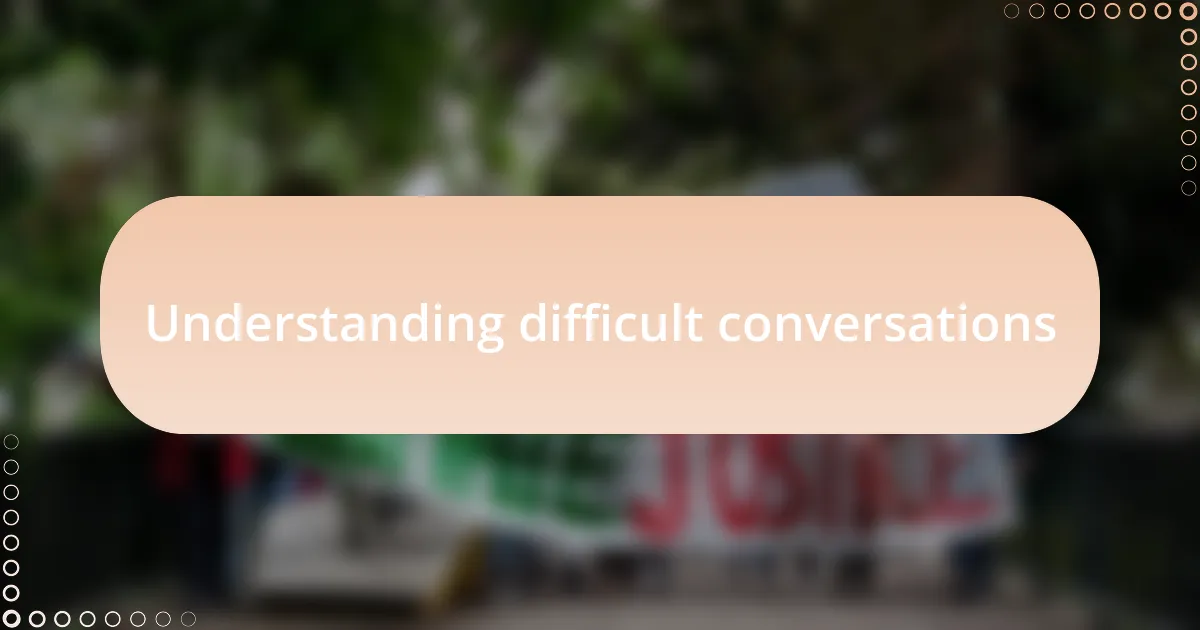
Understanding difficult conversations
Difficult conversations often arise in the context of deeply held beliefs, such as those surrounding war and peace. I remember the first time I tried discussing my anti-war views with a close friend who held a contrasting opinion. We both had passionate points to share, but the conversation quickly turned tense, revealing that our understanding of empathy and respect was just as important as the arguments we were making.
When navigating these tough discussions, I’ve found it essential to approach the topic with curiosity rather than confrontation. Have you ever felt the urge to defend your position instead of genuinely listening? I experienced this firsthand, and it only led to frustration. By shifting my mindset to one of inquiry, I discovered how much more I could learn when I was open to understanding the fears and motives behind opposing views.
It’s crucial to recognize that our emotions can run high during these dialogues. I recall feeling a mix of anger and sadness when standing my ground against someone who misconstrued my beliefs. It was in those moments that I realized vulnerability can pave the way for connection. When we allow ourselves to express how certain issues genuinely affect us, it can transform a standoff into a collaborative exploration.
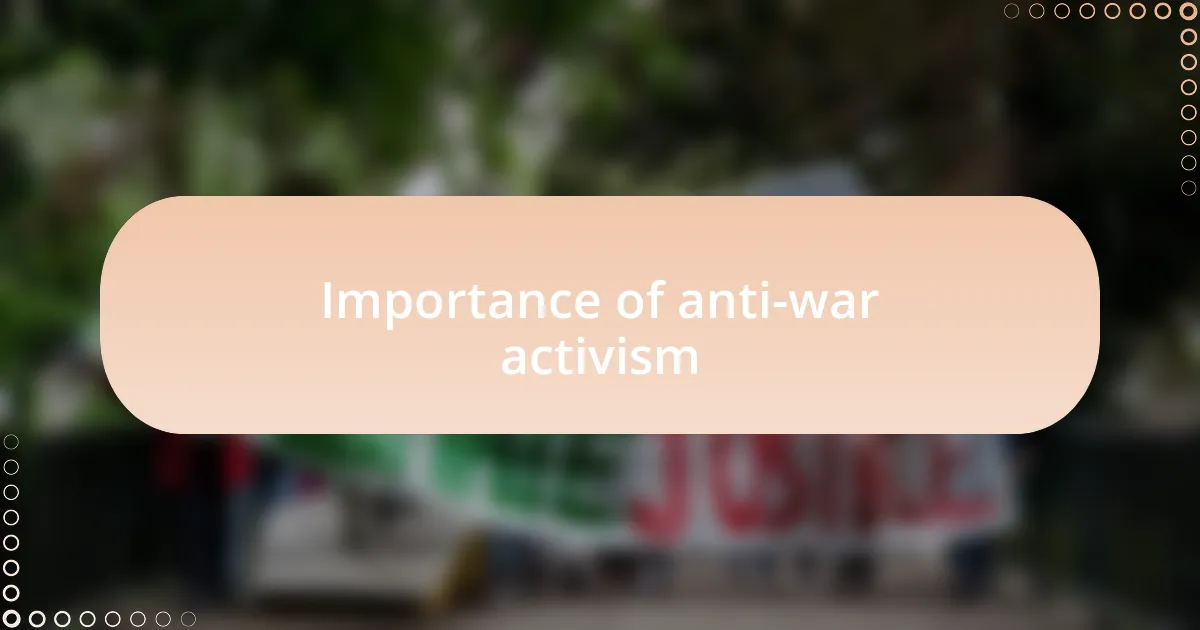
Importance of anti-war activism
Anti-war activism plays a critical role in shaping public discourse and mobilizing communities toward peace. I often reflect on the times I’ve participated in rallies, feeling a sense of camaraderie with fellow activists driven by a common cause. Those experiences reinforced my belief that collective voices can challenge the narratives that justify war and violence.
Engaging in anti-war activism is not just about opposing military actions; it’s about advocating for the human stories often overshadowed by political agendas. I remember attending a screening of a documentary that followed the lives of civilians in war-torn regions. Listening to their stories made the abstract concept of war painfully real for me. Have you ever heard a personal story that changed your perspective? It was in that moment I realized that every protest and campaign holds the potential to humanize complex issues.
Moreover, anti-war activism can foster critical discussions about the economic and social implications of war. I discovered this during a community forum where we debated the staggering costs of military spending versus funding social programs. It pushed me to consider: what kind of society do we want to create? Such conversations highlight that activism is not simply about resistance; it’s an invitation to envision a future rooted in solidarity and peace.
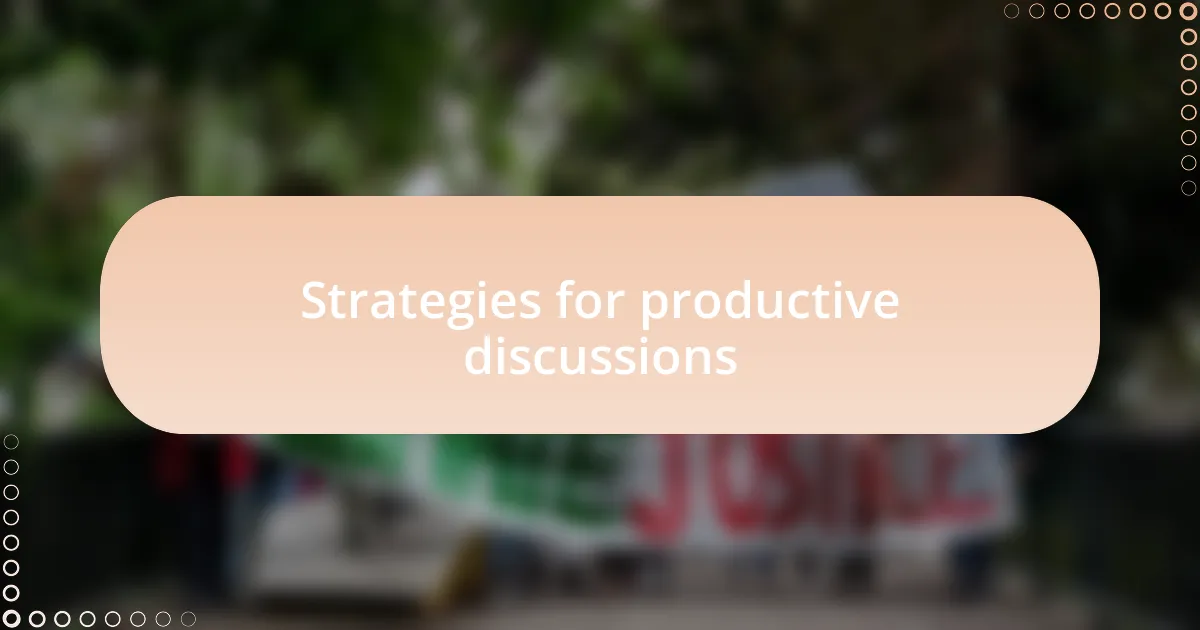
Strategies for productive discussions
To navigate difficult conversations effectively, I’ve found that active listening is indispensable. During a heated discussion at a local event, I focused on truly hearing the concerns of others, instead of just waiting to respond. This approach not only made the other person feel valued, but it also allowed me to connect their worries to broader anti-war narratives, fostering a more meaningful dialogue.
Finding common ground can be a game-changer in these discussions. I recall a time when I spoke with someone who had a different viewpoint about military intervention. We both shared a concern for the well-being of our troops and civilians, which opened the door to discussing how our goals could align, despite differing methods. Have you ever shifted the course of a conversation simply by identifying shared values? It’s remarkable how emphasis on mutual concerns can pave the way for productive solutions.
Lastly, approaching conversations with curiosity rather than confrontation shifts the tone significantly. When I previously engaged with someone who vehemently disagreed with anti-war activism, I asked questions not to challenge their views but to understand their perspective better. This curiosity turned what could have been a divisive interaction into a collaborative exploration of ideas, leaving us both feeling respected and heard.
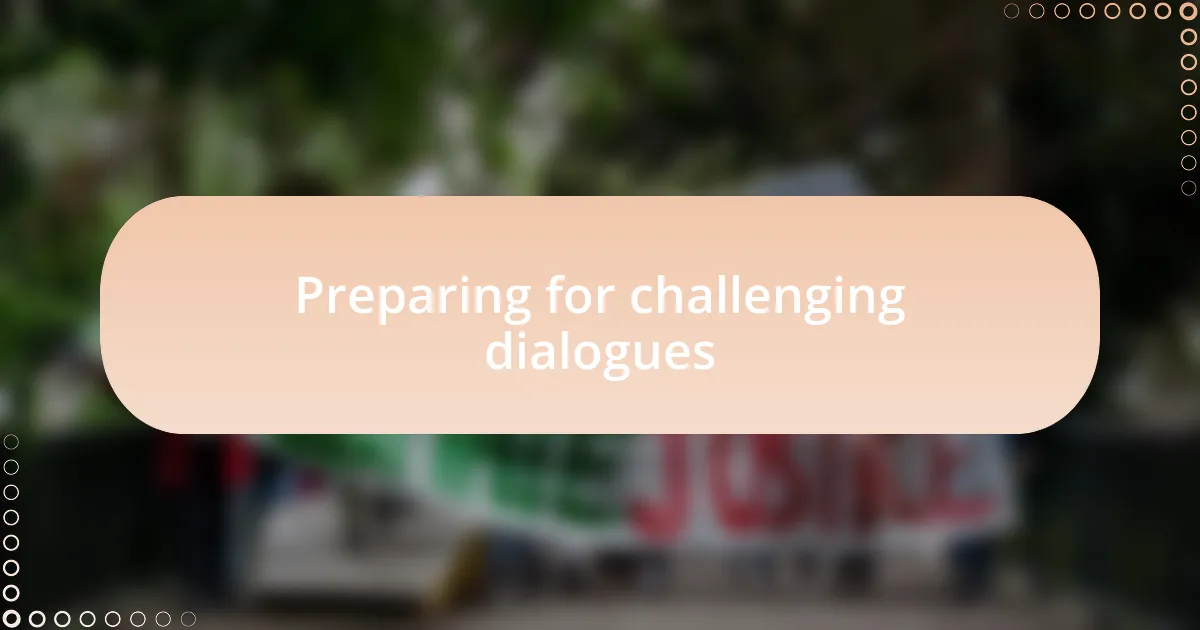
Preparing for challenging dialogues
Before diving into a challenging dialogue, I always take a moment to reflect on my own emotions and biases. I remember a time preparing for a conversation with a friend who was a strong advocate for military action. I realized my initial feelings were rooted in anger and frustration. By acknowledging my emotions beforehand, I managed to enter the discussion with a clearer mind, focusing more on understanding than reacting. Have you ever noticed how your feelings impact how you communicate?
Another key preparatory step I employ is gathering facts and perspectives from diverse sources. Prior to a local forum, I took the time to read articles and watch interviews that presented various viewpoints on anti-war measures. This research equipped me with a broader understanding and helped me anticipate counterarguments. When I finally engaged in conversation, I felt more confident, which allowed me to respond thoughtfully rather than defensively. Isn’t it empowering to feel well-prepared?
Lastly, I often visualize the conversation in advance, imagining different scenarios and potential responses. For example, before approaching a family member resistant to my views, I pictured myself calmly discussing our underlying values rather than getting stuck in a debate over details. This mental rehearsal eased my anxiety and allowed me to remain focused on connecting with them emotionally. Have you ever tried visualizing a conversation? It can transform your approach significantly.
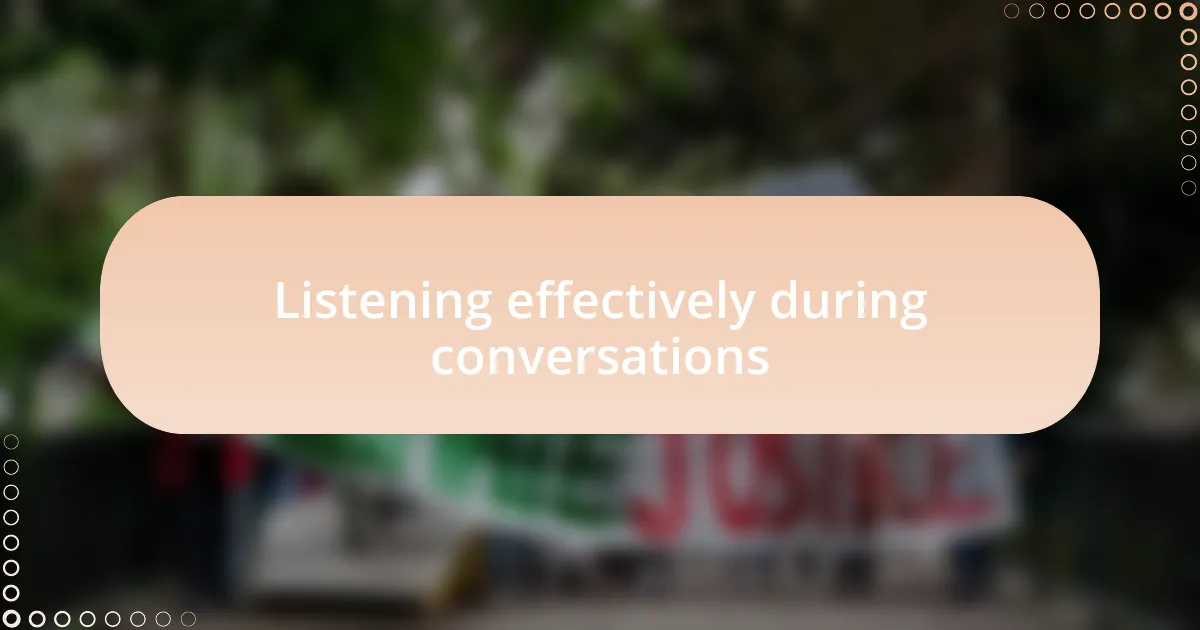
Listening effectively during conversations
Listening is often the cornerstone of effective communication, especially during difficult conversations. I once participated in a discussion where a colleague passionately defended military intervention. At first, my instinct was to interrupt, but instead, I took a deep breath and listened intently. By doing so, I not only gathered valuable insights but also created a space for reciprocity, which ultimately led to a more meaningful dialogue. Have you ever found that simply listening can shift the tone of a conversation?
Moreover, I’ve discovered that active listening goes beyond just hearing words; it includes observing body language and tone. I remember a moment when a friend expressed her pain over a family member’s deployment. Watching her tearful expressions made me realize the weight her words carried. This understanding prompted me to respond with compassion rather than debate. Isn’t it fascinating how nonverbal cues can enhance our grasp of someone’s feelings?
Lastly, I make it a practice to summarize what I hear, confirming that I truly understand the other person’s perspective. After listening to a heated debate on anti-war initiatives, I said, “So what I am hearing is that you feel our involvement only exacerbates conflict.” This simple reflection not only clarified my understanding but also signaled to the other person that their views were valued. How often do we take the time to ensure we are on the same page?
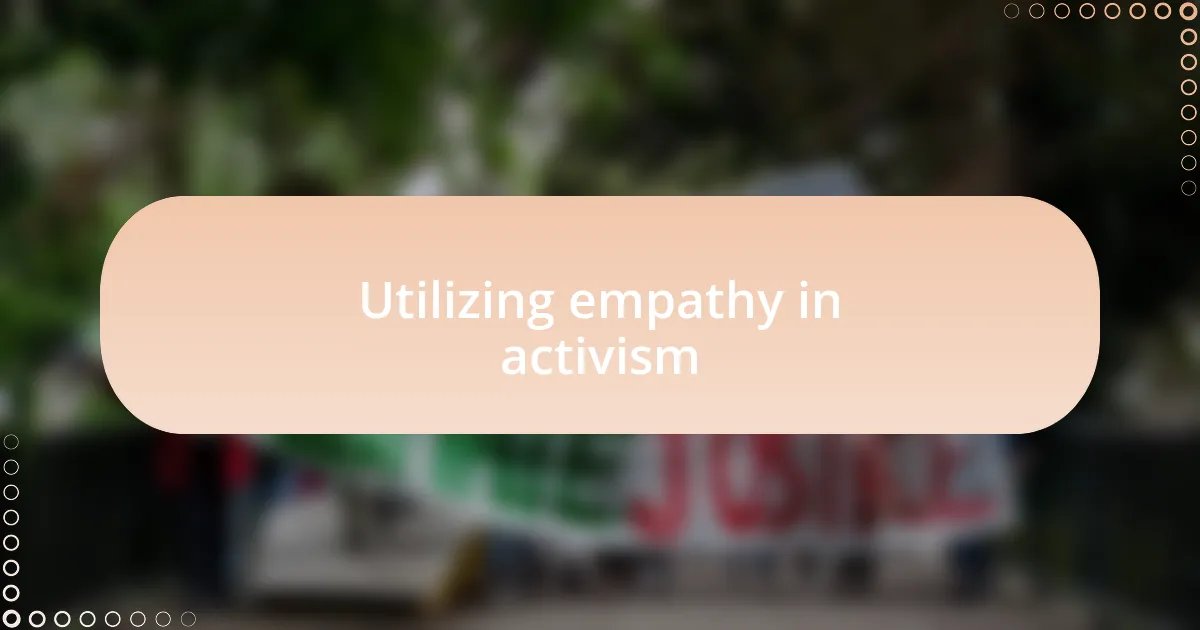
Utilizing empathy in activism
Empathy is a powerful tool in activism, as it allows us to connect with others on a deeper emotional level. I recall a protest I attended where a speaker shared her story of losing a loved one to violence. As I listened, I could feel my heart heavy with sorrow. In that moment, I realized that her struggle wasn’t just an abstract issue; it was a poignant reminder of the real human cost of war. Have you ever thought about how a single personal story can resonate far beyond statistics and rhetoric?
Engaging with diverse perspectives is another crucial aspect of utilizing empathy effectively. During a community meeting where various viewpoints clashed, I made an effort to acknowledge the fears of those who felt threatened by anti-war sentiments. I shared my own story of how war impacted my family, highlighting that we all seek safety and peace. This mutual recognition can foster a sense of solidarity, reminding us that despite our differences, we all share common hopes and fears. Doesn’t it feel refreshing to find a common ground when conversations get heated?
Furthermore, practicing empathy isn’t just about understanding others; it often pushes us to reflect on our own beliefs. There was a time when I held a rigid stance against military interventions, convinced I was right. However, after engaging in heartfelt discussions with people who had different views, I started questioning my own biases and assumptions. This internal dialogue helped me grow, illustrating that empathy not only enriches our activism but can also lead to transformative personal insights. How has your understanding shifted after considering another’s perspective?
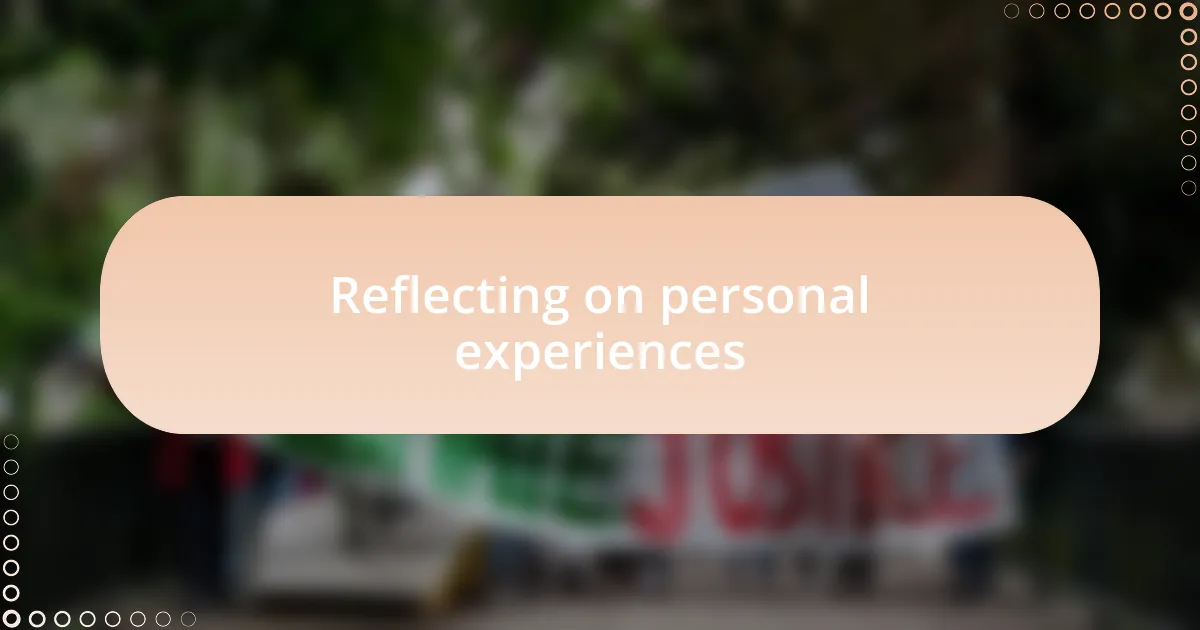
Reflecting on personal experiences
I often find that reflecting on my own experiences during difficult conversations can be an enlightening practice. One instance that stands out is a discussion I had with a close friend who disagreed with my anti-war stance. Instead of defending my position, I chose to listen to her viewpoint without interruption. By the end of that conversation, I not only understood her perspective better but also uncovered some of my own misconceptions about the motivations of those who support military action. Have you ever gained new insights simply by listening?
Looking back, I remember a heated debate at a local event where emotions ran high. I shared a personal story about a relative who served in the military, aiming to illustrate the complexities involved in discussions about war. To my surprise, this seemed to calm the room. It was a reminder of how sharing our personal narratives can diffuse tension and create understanding amidst differing opinions. Isn’t it fascinating how stories can serve as bridges, connecting us even when our views diverge?
Each difficult conversation I’ve navigated has taught me something valuable. For instance, after discussing my frustrations about government policies with a friend who works in politics, I found myself reflecting on the importance of intention behind those choices. I realized that anger often clouds my assessment of others’ motivations. This ongoing reflection has become crucial in my journey as an activist, prompting me to approach future discussions with a more open heart and mind. How have your past conversations shaped your views on sensitive topics?